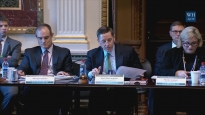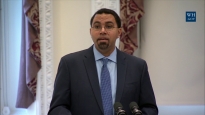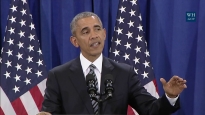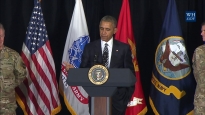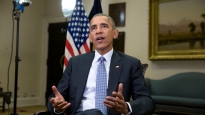President Obama Calls for New Steps to Prepare Children for College and Careers
February 22, 2010 | 24:55 | Public Domain
President Obama outlines new steps to better prepare America’s children for college and the workplace at a meeting with the National Governors Association. The President is calling for a redesigned Elementary and Secondary Education Act that includes a comprehensive, new vision to help states successfully transition to and implement college- and career-ready standards by improving teacher preparation and development, upgrading classroom instruction, and supporting high-quality assessments.
Remarks by the President and the Vice President to the National Governors Association
10:15 A.M. EST
THE VICE PRESIDENT: Good morning, everyone. Well, I hope you all had a good time last night. And I kept my tradition of not making more of a fool of myself than I usually do by not letting you all see me try to dance. There was one reason -- I used to say to Governor Markell of Delaware -- why I never ran for governor -- you have to have an inaugural ball. (Laughter.) And that's why I stayed in the Senate all those years.
First of all, thank you all for being here. It seems I've spent so -- you guys have spent, and ladies have spent, so much time with me on the telephone. I can't tell you how much I appreciate our almost biweekly conversations. But now I’ve gotten a chance to speak to all of you but two, and most of you twice for a half hour or so about the Recovery Act.
And the first message I want to deliver to you is thanks. You have -- we put out a lot of money for a lot of projects, a lot of money that isn't projects -- tax cuts going into your states as well as health care monies. And the truth of the matter is the hardest part is accounting for the projects. And a lot of those projects weren’t directly in your control, Gov. I know that. But yet you guys oversaw it. And we had -- in the Recovery Act, there's been 160,000 reports filed. They've been sent out -- sent in from around the country. And anyone can go to our Web site, recovery.gov, to find out exactly how those projects -- how that money was spent out, where it was spent.
And the thing I want to thank you most for -- and I kid you all when I'm on the conversation with you, say, well, why am I being so responsive. Well, if it doesn’t work it's my problem with the boss -- coming in in a minute here. (Laughter.) And so that's why I try to be -- we try to be as responsive as we can. But what I'm here to say to you all is you've been incredibly responsive to me, and to us, in terms of getting those reports in.
And as I said, the thing I'm, quite frankly, proudest of is that dog hasn't bitten yet. Remember at the beginning we were going to have all these massive fraud programs, anything this big was going to -- and you know, there's been some mistakes and some of the programs don't really pass the smell test. They're legal and they're appropriate, but they just don't look right on paper. But it's a very small percentage.
The inspector generals who have been looking at each one of these projects -- there's a panel of 10 inspector generals that reviews this -- there's very, very few -- I mean, less than a couple dozen that have been referred for further investigation, based on all the reports of any fraud coming in as a conduct of the program. That's a great tribute to you all.
But I also know how difficult it is, the reporting piece of this. It takes a lot of your time, a lot of your effort. I apologize for being such a pain in the neck about it, but you've been great.
And the fact is, folks, that part of the program, the Recovery Act now -- and by the way, I think most people, and you all, Republican and Democrat, have been great. The truth of the matter is that a lot of people thought, as my grandpop would say, the Recovery Act was the horse that was going to carry the sleigh, the entire economy, and pull it. It was only one piece of the economic recovery program. But almost everyone now agrees that it created somewhere between -- or saved -- somewhere between 1.6 million and 2.4 million jobs. We're confident it's over 2 million jobs.
And we also know, as the President said last night from the podium when we were sitting right here that a lot of you have a FY'11 budget that's pretty steep as well, but last year out a lot of you were able to keep firefighters, school teachers, police officers on the job.
And one of the things that everyone, even the critics, now acknowledge is that the Recovery Act played a significant part in the growth of the GDP. The first quarter of last year the economy shrunk by over 6 percent -- 6.4 percent. Last quarter, a year later, it actually grew almost 6 percent -- 5.7 [percent]. But we all know a lot of people are still hurting. I mean, I've traveled into now 65 cities, I think it is, in your states and a lot of people are still hurting. Employment is lagging, and it's going to be -- it's a real scramble for a lot of people.
My grandpop used to have an expression -- a couple of you heard me say -- when the guy -- he was from Scranton -- when the guy in Oliphant's is out of work it's an economic slowdown -- that's a little town outside of Scranton. When your brother-in-law is out of work it's a recession. When you're out of work it's a depression. It's a depression for a lot of Americans. You all are right on the front lines trying to deal with the concerns and problems of those people.
But the next phase of the act -- and I'll conclude with this and introduce the President -- the next phase of the recovery monies -- and there's a lot of it left -- is in projects, but also in signature projects that we hope are not only going to create -- we're confident are going to create jobs, we hope they're going to begin to lay a new platform for an economic growth cycle in the 21st century. They are innovative. They range from everything from broadband that a lot of you are working on to high-speed rail, to a new electric grid and meters, and investment in battery technologies -- a range of things that are designed not just merely -- which is critical -- to get the economy moving and keep it moving, provide jobs and initiate new jobs, but they're also leveraging a lot of private capital, a lot of money.
I was talking to Governor Christie a moment ago. It used to be, five years ago when we tried to talk about wind power along the East Coast, there was Delaware and no one else was doing it. All of sudden we started to invest in it and now you've got millions of megawatts of programs that are being suggested. Same way with solar energy. We're making major new investment in the Mohave Desert, a billion-dollar commitment.
So there's some real -- there's some real hope that we're going to be able to generate significant, new projects. I know in the far West we're having some trouble about getting some of this off the ground and transmission and the rest. But you all have worked with us, you've given us great insight as to where the biggest problems are. We're trying to work through them, but we can't do it without you.
And so in this last phase, which is this next year, of the Recovery Act, I hope you will continue to be willing to be as available to me as you have been, and I hope we’ve proved to you that we're looking for your ideas. We don't think everything is invented here, and so let us know how we can best implement the last portions of the most innovative parts of the Recovery Act.
With that, ladies and gentlemen, I'd like to introduce the President, who is focused on rebuilding our infrastructure and sparking a new clean energy revolution, creating the best education system in the world. That's what he's undertaking. Some say we're doing too much, but the truth of the matter is, is there's no way that we can lead in the 21st century with the same energy policy, the same education system, and the same effort, same infrastructure we have now. So we've got to deal with all this. I think we're on the right path. I'm glad you all are the ones that are leading the effort for us. You've been a great source of ideas. And again let us know what you think we're doing right and what you think we're doing wrong.
With that, ladies and gentlemen, let me introduce the President of the United States, Barack Obama. (Applause.)
THE PRESIDENT: Thank you. Please, everybody have a seat. Thank you.
I hope nobody stayed up too late last night, because I’m looking forward to a productive challenge and challenging conversation this morning. Joe, thank you very much for your remarks. And I want to again thank Governor Douglas and Governor Manchin for their outstanding leadership with this organization.
I want to spend most of my time exchanging ideas with you and answering questions, but let me just preface this with a few remarks. I want us to begin by remembering where we were just one year ago. As I mentioned last night, our economy was in a full-blown crisis; 750,000 Americans were losing their jobs each month, and millions more were hurting at the end of one of the toughest decades for the middle class on record. And just as they turned to you like never before, budget shortfalls threatened your capacity to help.
And that was just a few days before I signed the Recovery Act into law -- a plan that many of you were instrumental in devising. That plan cut taxes for small businesses and for 95 percent of working Americans. It gave direct relief to those hardest hit by the recession, including workers who lost their jobs and families who lost their health care because of it. It helped most of you close some of those budget gaps that had developed, which kept 300,000 teachers and education workers in your schools and tens of thousands of first responders on your streets.
And it began rebuilding our economy on a new and stronger foundation for growth. We helped to jumpstart a clean energy industry in places where there were none, as Governor Granholm can attest in Michigan. We followed the gospel of Governors Rendell and Schwarzenegger and invested in our infrastructure; creating private sector jobs rebuilding today's crumbling roads and bridges, but also constructing the smart grids and the high-speed rails that are so critical to our future. And that's helping many of you prepare your states for future growth -- like Governor Baldacci, who's accelerating his vision to connect broadband to every corner of Maine; or Governor Barbour, who's boosting plans to bring more commerce into Mississippi ports and out by rail to the rest of America.
Independent economists credit the Recovery Act with growing the economy and for 2 million jobs that otherwise wouldn't exist. Now, I understand that some of you still claim it's not working or wasn't worth it, but I also know that you've used it to close your budget gaps or break ground on new projects. I've seen the photos and I've read the press releases. (Laughter.) So it must be doing something right.
Overall, the economy is in a better place than it was a year ago. We were contracting by 6 percent and we're now growing by 6 percent. But I know that your states are still in a very tough situation, and too many Americans still haven't felt the recovery in their own lives. So we're working to create jobs by all means necessary, be it by cutting taxes for small businesses that create them, to investing more in infrastructure and in energy efficiency, or giving you more help to close budget shortfalls. And I am not going to rest until we see more progress in each and every one of your states.
As governors, I know you feel the same responsibility to see the people we serve through difficult times. And I know you share my feelings that we've also got a responsibility to think beyond the crisis and build an economy that works for our future, to tackle some of the problems and barriers that have held us back, and to secure our rightful place as the preeminent economy in the 21st century.
And that's why we've taken up the cause of better health care that works for our people, our businesses, and our governments alike. That's why we will continue to fight for the cause of clean energy, an economy that will free ourselves from the grips of foreign oil and generate millions of good jobs and good wages in the process. That's why we've taken up the cause of guaranteeing that Americans have the knowledge and the skills and education they need in this new and changing world.
America's prosperity has always rested on how well we educate our children -– but never has that been more true than it is today. And it's true for our workers as well, when a college graduate earns over 60 percent more in a lifetime than a high school graduate. This is true for our businesses when, according to one study, six in 10 simply cannot find the qualified workers that they need, are ready and willing to hire.
Unfortunately, we continue to lag in several critical areas. Our eighth grade students are ninth in the world in math, and 11th in science. In response to assessments like these, some states have upped their game -- I want to point to Massachusetts as an example, where eighth graders now tie for first in science around the world. Some unfortunately -- some states have actually done the opposite -– and between 2005 and 2007, under No Child Left Behind, 11 states actually lowered their standards in math.
That may make those states look better relative to other states, but it’s not going to help our students keep up with their global competitors. When I visited South Korea last year -- and I've told this story before -- I had lunch with President Lee and I asked him, what’s your biggest education challenge? And he said, my biggest issue, my toughest fight is that Korean parents are too demanding. They want their kids to learn English in first grade, and so I've had to ship in a whole bunch of foreign speaking teachers to meet the demand. They want their students learning everything -- math, science, foreign languages -- all as soon as possible. They want their kids to excel because they understand that whichever country out-educates the other is going to out-compete us in the future. So that’s what we’re up against. That's what’s at stake -– nothing less than our primacy in the world.
As I said at the State of the Union address, I do not accept a United States of America that's second place. And that means that all of us are going to have to work together to make sure that we are taking seriously the investments we make in our children’s future. That’s the reason that we launched the Race to the Top, a national competition to spur reform and improvements in our schools.
We put $4 billion on the table and challenged states to compete for it, saying that if you embrace reforms that raise achievement, if you track and respond to student needs; if you evaluate and reward great teachers and principals and turn around failing schools, then we're going to help you make those reforms a reality. Many of you and your states already have, and that’s why we’re going to expand the Race to the Top program.
And I want to commend all of you for acting collectively through the National Governors Association to develop common academic standards that will better position our students for success. Many states have already positioned themselves to adopt higher standards; and today, I’m announcing steps to encourage and support all states to transition to college and career-ready standards on behalf of America’s students.
And I know that many of you have had a chance to interact with our Secretary of Education, Arne Duncan, who's doing a terrific job, and I think you understand when you talk to him that this administration is serious about breaking down some of the barriers to reform that have existed in the past. We are tired of arguments between the left and the right, between reformers and teachers' unions. We want to figure out what works and we want to make sure that we are giving you the support and the resources that you need to implement what works. (Applause.)
Now, of course, lifting achievement and transforming our schools is going to require more than new standards -– it's going to require better teaching, better curricula, it's going to require better assessments. So we are calling for a redesigned Elementary and Secondary Education Act that better aligns the federal approach to your state-led efforts while offering you the support that you need. Let me just be specific on some things that we're looking to do this year.
First, as a condition of receiving access to Title I funds, we will ask all states to put in place a plan to adopt and certify standards that are college and career-ready in reading and math. Once you've got those standards in place, you’ll be able to better compete for funds to improve teaching and upgrade curricula. If a university, state, or school district begins preparing educators to teach to higher standards, we’ll give them the support that they need. And to make sure that we’re delivering for our kids, we’re launching a competition to reward states that join together to develop the highest-quality, cutting-edge assessments required to measure progress; and we’ll help support their implementation.
This all goes hand in hand with our efforts to give every American a complete and competitive education. We are making college more affordable by increasing Pell Grants, we're continuing a new $2,500 tax credit for four years of college tuition, we are working to ease graduates’ debt burdens, because I believe and I think you do too that nobody should go broke because they decided to go to college. We’ve provided the resources to effectively implement the Post-9/11 GI Bill, because every returning soldier should have the chance to begin a new life prepared for the new economy.
We’re strengthening our community colleges, because all of you know that they are outstanding career pathways for the children of so many working families. And we’re working to reform the student loan program and save tens of billions of dollars that currently go to subsidizing financial intermediaries, because instead of having that money go to middle men we think it makes sense to spend that money educating the next generation.
Now, if we can come together and do all this -- in Washington, in state houses, and across party and ideology –- we’re going to raise the quality of American education; we’ll give our students, our workers, and our businesses every chance to succeed; and we are going to secure this next century as another American century.
Let me just close by saying this, we’ve been trusted with the responsibility to lead at a defining moment in our history. We’ve been tasked to not only see this country through difficult times, but to keep the dream of our founding alive for the next generation. That’s not something to shy away from. It’s something to live up to. And I intend to work closely with all of you -- Democrats and Republicans -- to do just that.
So with that, what I'd like to do is start the discussion. I think that what we're going to do is I'm going to call on Jim and Joe first. And then, after they've made their opening statements and remarks, then we'll kick the press out, and everybody will roll up their sleeves and we'll get to work.
END
10:26 A.M. EST
|
December 7, 2016
|
December 7, 2016
|
December 7, 2016
|
December 6, 2016
|
|
December 6, 2016
|
December 5, 2016
|
December 4, 2016
|
December 3, 2016
|
- &lsaquo previous
- …
- 3
- 4
- 5
- 6
- 7
- 8
- 9
- 10
- 11
- …
- next &rsaquo

